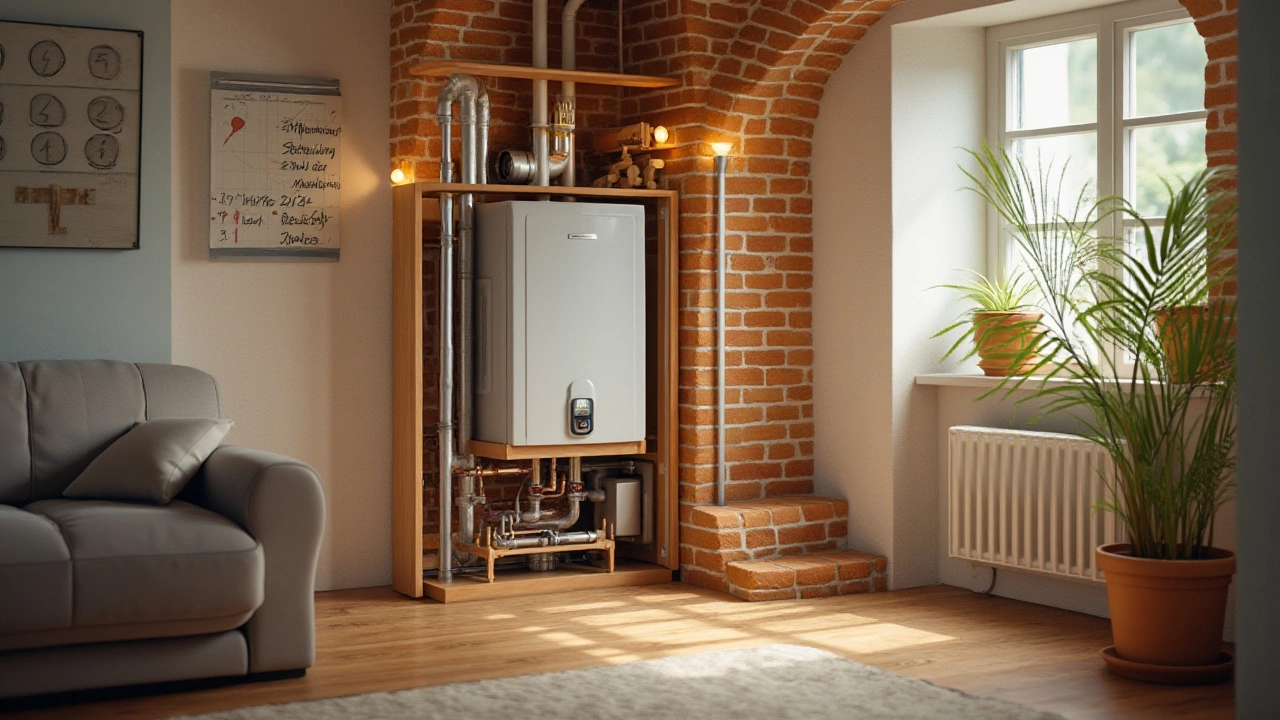
- 26 Jan 2025
- Gideon Thornton
- 0
Thinking about how long your boiler might last can be a bit like trying to predict the weather next month – tricky, but not impossible. With boilers at the heart of our home comfort, it's crucial for us to get a grip on their lifespan and what influences it. Your boiler isn't just a metal box in a cupboard; it's a machine doing a hefty job.
Typically, a boiler is known to last somewhere between 10 and 15 years. Yet, not all boilers are created equal, nor do they operate under the same conditions. Some live a long, fruitful life thanks to regular loving care, while others might surprise you with an unexpected, premature farewell.
Throughout this read, we'll dive into various elements that play into the life cycle of a boiler and serve up some practical advice. From understanding what affects its lifespan to maintenance hacks and recognizing warning signs, you're sure to come away with valuable insights.
- Understanding Boiler Lifespan
- Factors Affecting Longevity
- Signs Your Boiler Needs Attention
- Maintenance Tips for Longer Life
- When to Consider Replacement
Understanding Boiler Lifespan
When it comes to gauging the life expectancy of a boiler, there's a great deal more than merely checking a calendar. The truth is, a boiler's lifespan doesn't only depend on its age but rather on a fusion of several key factors that contribute to its endurance or, in some cases, early demise. In the realm of heating systems, the names you often hear—such as Vaillant, Worcester, and Ideal—are renowned for their robustness, each claiming an average lifespan of around 12 to 15 years if maintained properly.
The heart of the matter is maintenance, and like any mechanical system, regular care is the key to vitality. Boiler systems typically operate under intense conditions, dealing with fluctuating temperatures and pressures. Each night, when you cozy up with your favorite book in the warmth, remember that your boiler is tirelessly hustling behind the scenes. It's the unsung hero of winter warmth, with the average number of operations reaching over 80,000 heating cycles during its lifetime. But without adequate check-ups, minor hitches can snowball into major snags.
Types of Boilers
The boiler type also plays a significant part in its longevity. Combi boilers, known for their efficiency and space-saving design, often face a shorter lifespan in bustling homes due to their dual function of heating water on demand. Conventional boilers, on the other hand, tend to enjoy longer lifespans due to their simpler operation, but they require more space and a hot water cylinder.Environmental Effects
Another factor to weigh in is the installation environment. Boilers installed in garages or lofts may encounter harsher conditions, such as temperature extremes and increased dampness, hastening wear and tear. A boiler in a moisture-prone area might face problems like rust, reducing its life. In fact, studies have shown that environmental factors can impose up to a 20% variance in boiler longevity."A well-maintained boiler can often outperform its expected lifespan by 5 years or more," says Jane Dawson, an engineer with over 20 years of experience in the field.
As we trudge along this path of understanding, let's not forget the pivotal role of original installation. A shoddy installation can lead to a plethora of problems, reducing even the best boiler to a clunky metal box. Safe and efficient installation is crucial, ensuring the system operates just as the manufacturer intended. It emphasizes the blanket advice given by experts worldwide: ensure a certified professional handles your installation.
Factors Affecting Longevity
When it comes to how long your boiler will serve you, various elements come into play. Just like any piece of machinery, boilers require attention and understanding to maximize their lifespan. The first factor that significantly impacts a boiler's longevity is its type. Different types such as combi, system, and conventional boilers have different durability scales largely due to their build and how heavily they are used. Combi boilers, for instance, are particularly popular due to their efficiency but might not last as long if they're relied on heavily in a large household.
Another key player in a boiler's lifespan is the quality of the installation and initial setup. A poorly executed installation can lead to numerous issues down the line, reducing the life expectancy of the boiler. This is why it's imperative to hire a qualified and experienced professional for the job. Beyond installation, regular boiler maintenance plays a crucial role too. Boilers that are serviced at least once a year are more likely to last longer, as any potential issues can be nipped in the bud before they become bigger headaches.
The hardness of water in your area can also affect the performance and longevity of your heating system. In regions with hard water, minerals like calcium and magnesium can accumulate within the boiler system, causing limescale build-up. Over time, this can lead to parts malfunctions or even the system failing. In these situations, installing a water softener might be a wise long-term investment. Equally important is the usage pattern of the boiler. Overworking a boiler by running it non-stop can hasten its demise, just as underuse can cause parts to stiffen, leading to unexpected breakdowns.
According to the Energy Saving Trust, "boilers will inevitably wear out due to normal operation but consistent servicing can greatly extend their operating life, typically up to 15 years with careful use."Lastly, let’s not overlook environmental factors, which can subtly but surely influence the boiler’s durability. Boilers kept in cold, uninsulated spaces battle an uphill struggle against the elements, leading to increased energy consumption and wear over time. Thus, ensuring a well-insulated location for the boiler can help stave off energy waste and wear-related issues. When all these factors are considered together, it's clear that a combination of smart choices, routine care, and environmental considerations contribute significantly to a boiler's longevity.

Signs Your Boiler Needs Attention
Your heating system is like the heartbeat of your home, and when it skips a beat, you usually can tell. When your boiler starts acting up, it often sends out signals that something's amiss. Ignoring these signs can lead to more costly boiler repair down the road, so it's crucial to stay vigilant and act swiftly. Homeowners should get acquainted with the language of their boilers to catch problems early.
First off, if your heating system is making unusual noises, it's trying to get your attention. A boiler in good condition should operate quietly. Rattling, banging, or whistling sounds might mean there's air in the system, low water pressure, or worse, a looming mechanical failure. Other tell-tale signs are cold spots in your home. If certain rooms aren't as warm as others, it might mean that your boiler is struggling to distribute heat evenly. Sometimes these issues can be rectified by bleeding your radiators, but they can also indicate more significant problems with your boiler's efficiency.
Another issue to watch out for is a spike in your energy bills. An inefficient boiler uses more fuel than necessary to heat your home, leading to increased costs. Tracking your energy usage can offer insights into your boiler's performance. Set a baseline by recording your typical winter energy use and compare it periodically. If you notice an inexplicable rise, your boiler might need attention. This could be due to old age or wear and tear, which are not uncommon factors in any heating system's life cycle.
Frequent resets on your boiler could be another cry for help. Modern boilers often have reset buttons as a safety measure, but if you're finding yourself constantly pushing this button, it suggests a more profound issue. This could range from temporary blockages to more complex internal issues requiring professional intervention. Additionally, a boiler that frequently needs resetting may not be safe to use, warranting an immediate check-up from a certified engineer. As one expert eloquently said,
"A boiler isn't just a piece of equipment, it's part of the ecosystem that keeps a home running smoothly."
Finally, pay attention to the age of your boiler. Like all mechanical devices, boilers have a finite lifespan. If your boiler is approaching ten years old or more, it may be time to consider its long-term viability. Regular servicing is crucial not just for prolonging the unit's life, but also for your peace of mind. An annual service is like a health check for your boiler, capable of diagnosing small issues before they transform into costly repairs or replacements.
These warning signs are your boiler's way of asking for help. Responding to them promptly not only ensures the longevity of your heating system but also keeps your home safe and cozy. By staying alert to these symptoms and maintaining regular checks, you can avoid deep-seated issues and enjoy a consistently warm home environment.
Maintenance Tips for Longer Life
For any homeowner, understanding how to extend the life of their boiler is as crucial as keeping the lights on. Regularly attending to your boiler is much like tending a garden; neglect creates chaos, but with the right care, everything runs smoothly. Performing routine upkeep not only prolongs a boiler's operational life but also enhances efficiency, saving both energy and money. Think of it as a small investment of time that pays off handsomely in comfort and savings.
One of the first things to consider is annual servicing by a qualified professional. Just like taking your car for a regular check-up, having an expert inspect your boiler ensures that everything is running as it should. They can preemptively spot any signs of wear or potential issues before they escalate into costly repairs. Moreover, regularly flushing your boiler system is key in preventing sediment build-up, which can drastically hamper heating efficiency. It's akin to clearing debris out of a clogged drain; sometimes, a little flush is all it takes to restore flow.
Check Pressure Levels
Maintaining the correct pressure is another crucial aspect. Boilers are designed to function at specific pressures; if the pressure is too low, it compromises performance, and if it's too high, it can strain the system. Regularly checking and adjusting the pressure, using the pressure gauge, can make all the difference. It’s worth noting that every boiler model has its own optimal pressure range, typically found in the user manual. When in doubt, checking this can save a lot of hassle.
Bleeding your radiators periodically should also be on your to-do list. Over time, air can get trapped in the system, leading to cold spots that make your heating less effective. This process effectively releases air pockets, allowing hot water to flow freely. It's a simple task that can make your heating system more efficient, ensuring every room in your home enjoys consistent warmth.
Keep an Eye on Unusual Noises
It's often said that when machines start making unexpected noises, it’s their way of communication. If your boiler starts producing strange sounds, it's worth paying attention to. Unusual noise can often indicate trapped air, low water pressure, or even a mechanical fault. Addressing these sounds early can prevent them from snowballing into bigger issues. A good ear, in this case, is an excellent tool in preventative maintenance.
"The secret to longevity isn’t magic, it's maintenance," says Paul Green, a renowned heating expert.
Schedule Regular Inspections
Finally, don't underestimate the power of regular visual checks. Inspect your boiler and the surrounding area for any leaks or signs of corrosion. While it might seem mundane, spotting a minor leak early on can avert a significant problem down the line. Keeping the surrounding area clean and free from obstructions also ensures better air circulation and overall performance. If your boiler is housed in an isolated space, like a cupboard, make sure ventilation is adequate as overheating can lead to unnecessary wear.
By embracing these maintenance practices, you’re not just ensuring your heating system runs efficiently; you’re giving your boiler the best chance at a long, productive life. These small acts of care contribute not only to the longevity of the boiler but also to the comfort and peace of mind in your home.

When to Consider Replacement
It's a moment all homeowners eventually face: wondering whether it's time to bid farewell to the trusty boiler that has served faithfully through many a cold winter. Recognizing when a replacement is necessary isn't just about reacting to a complete breakdown. Sometimes, continuing with an aging model can lead to higher costs and inefficiencies, making proactive replacement the smarter move. At an average lifespan of 10 to 15 years, boilers, much like our favorite sweaters, don’t last forever. They start giving signs that all is not well.
Listen closely to what your heating system is telling you. If your boiler needs repair several times a year, especially with parts that are costly or hard to find, it might be plot-twisting to steer towards replacement. Consistent breakdowns are not only inconvenient but can also add up in costs to an extent that rivals a new boiler's price tag. Additionally, consider energy efficiency. Older boilers might only operate at 60-70% efficiency, while newer models often boast over 90%. That’s a significant difference reflected in your energy bills. As Energy Star reports, upgrading to a more efficient model can save a homeowner up to 15% on heating costs annually.
Sometimes, your boiler whispers tales of replacement through unusual noises, like bangs, whistles, or clunks, frequently hinting at imminent failure. Similarly, if it seems that your boiler takes ages to heat up or struggles to maintain temperature, it may not be performing optimally. Not to be overlooked is the color of the flame in your boiler – a yellow flame instead of blue can signify inefficient burning or even carbon monoxide production, a serious risk that should push replacement higher up the priority list. Even if you don't spot other issues, the presence of a yellow flame should prompt a consultation with a professional.
A survey by the Energy Saving Trust suggests that another key prompt for replacement is adding additional structures or home extensions. Your current boiler may not cut it when faced with supplying warmth to a larger space. Assessing the current and projected demands on your boiler is crucial for both comfort and efficiency. Never underestimate the seasonal strain on your heating system – as it can be crucial evidence pointing towards a new boiler.
"An old boiler nearing the end of its service life often works as the thief of warmth and money," reflects Home Heating Expert John's comprehensive analysis in his HVAC Monthly. "Recognizing its final days can save you more than a chilly night and a dramatically inflated energy bill."
The price of inaction as your boiler creeps toward the two-decade mark can be staggering. With constant maintenance costs, inefficiencies, and potential damage to your property due to leaks or failures, the investment in a new boiler becomes more justifiable. By weighing the initial costs against long-term savings and peace of mind, you'll ensure your home remains as the sanctuary lived in by happy, warm inhabitants. Don’t just wait for the boiler's swansong; instead, get ahead with timely, decisive action.



